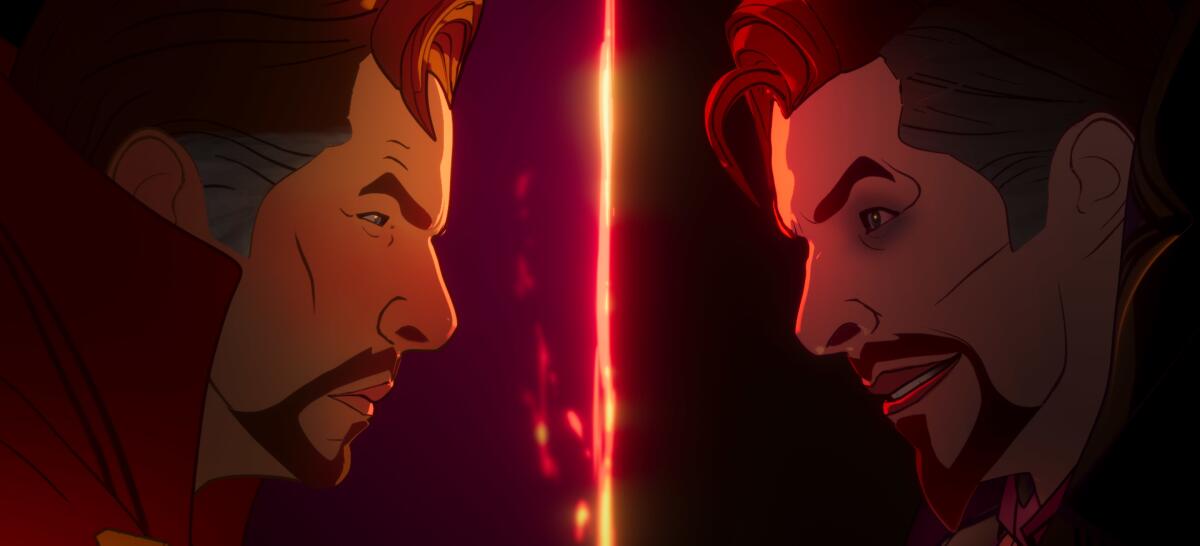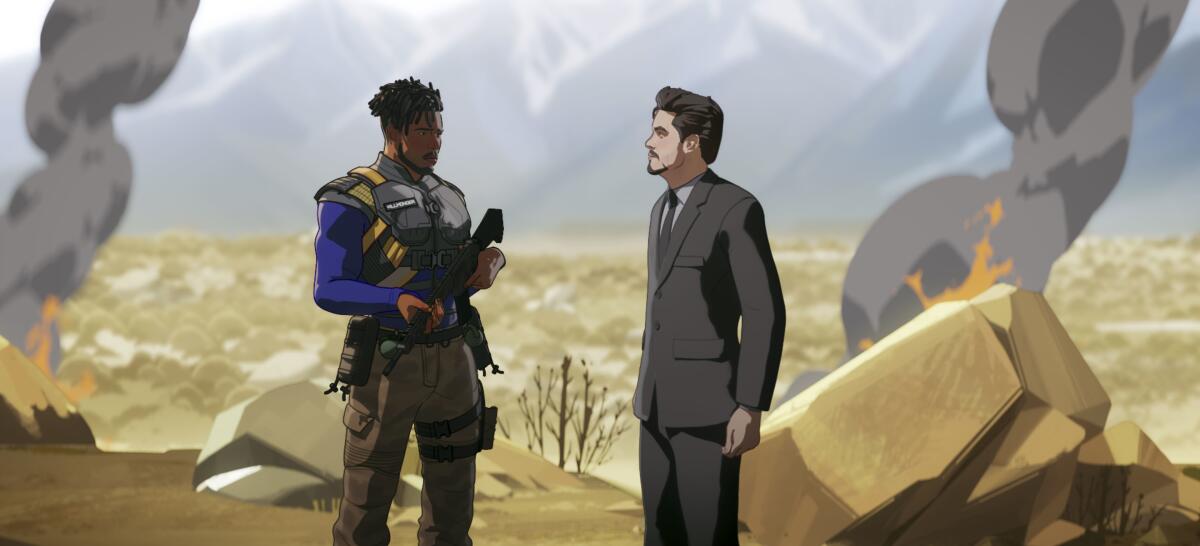‘What If...?’ is the MCU’s first big misstep. Why the series should have fans worried

- Share via
Respect for the audience. Carefully considered plots. Thoughtfully developed characters. These have been the hallmarks of the Marvel Cinematic Universe.
Then came “What If ...?”
At first glance, the juggernaut’s fourth Disney+ series — an animated show investigating how well-known stories might have turned out differently with one crucial tweak — looked like a chance to have fun with the Marvel mythos, inviting plenty of “Whoa” moments along the way. That’s how the comic it’s based on played out, at its best.
The complete guide to home viewing
Get Screen Gab for everything about the TV shows and streaming movies everyone’s talking about.
You may occasionally receive promotional content from the Los Angeles Times.
Instead, the series, which concludes Wednesday, has been a thuddingly unimaginative waste of its unlimited canvas: Though it could conceivably use any character or location, any plot device or twist, “What If ...?” produces a disappointingly small number of mouth-agape moments — if any. And given that it’s an exploration of the Multiverse — the driving force of several upcoming MCU movies — the show’s shortcomings may be an ominous sign of things to come for the most successful entertainment franchise ever.
That’s not to say the series is without merit. “What if ...?’s” animation is beautiful. Top actors from the movies lend their voices, including Chadwick Boseman in his final performance as T’Challa. The gonzo, anything-can-happen re-imaginings have their fun. The cameos are entertaining (yes, that was Kurt Russell dropping in for a line as Ego, and Howard the Duck, Drax and others partying in Vegas).
With twisted timelines and character “variants,” Marvel’s adventure can be hard to keep straight. Here’s an episode-by-episode guide to help you out.
But ultimately these are just silver linings. At their core, the episodes are dominated by exposition and plot, leaving relationships, motivations and emotion out of the equation. The dialogue consistently plays down to an audience the makers assume is easy to please. In the finale, Uatu, the inscrutable Watcher voiced by Jeffrey Wright, says with cosmic gravitas, “It’s showtime,” while a wan attempt at “cute wordplay” between Captain Carter and Black Widow fails not once, but twice. . Even the humor, such as Episode 7’s depiction of Thor, God of Thunder, as Thor, Prince of Parties, has felt like a big-budget “SNL” sketch rather than conjuring the organic silliness of, say, “Thor: Ragnarok.”
All of this adds up to nonexistent dramatic stakes, the equivalent of what DC Comics used to call “imaginary stories.” The death of Tony Stark in “Avengers: Endgame” was tremendously moving to MCU fans (though some observers insist these movies don’t “convey emotional, psychological experiences to another human being”); it’s hard to imagine the multiple deaths of Tony Stark in “What If ...?” make so much as an emotional ripple. Cap is a zombie now? No worries, he’ll be fine in the next episode. Ultron has destroyed the universe? Thank you, next. It’s the MCU equivalent of Pam waking up to find Bobby alive and in the shower.

Something the MCU has been very good about is keeping dead characters dead. That finality makes death matter. In the comics, of course, when a main character dies, it provokes little more than a yawning “How many issues until they’re back?” from veteran readers.
“What If ...?’s” habit of beloved characters biting the dust and spitting it out from episode to episode resembles a grim game of Whac-A-Mole, which bodes ill for the MCU’s Multiverse, with its infinitely varied timelines offering infinitely varied outcomes.
What’s to stop the MCU from dipping into a mole hole in a future Avengers movie to produce an alive-and-well Tony Stark who stopped Thanos without dying in another universe? The “Spider-Man: No Way Home” trailer features a villain who died in his last appearance (Alfred Molina’s Doctor Octopus, R.I.P. in “Spider-Man 2”). The franchise is in danger of permanently opening the Doorway to Dullness if it nullifies the law of gravity so its characters’ deaths have no weight, as “What If ...?” shows.
Perhaps the series’ greatest sin, though, is its disregard for the MCU’s internal logic — or, really, any logic. The Doctor Strange-centric episode posited that the death of Strange’s beloved Christine was an immovable moment (an “absolute point”), and his attempts to avoid it would result in cosmic catastrophe. Except that it isn’t immovable or absolute at all: In Strange’s origin (“Doctor Strange,” 2015), Christine doesn’t die at all, and he still becomes the Master of the Mystic Arts. She lived; reality didn’t die.
“Falcon and the Winter Soldier” head writer Malcolm Spellman and director Kari Skogland on Sam Wilson, Bucky Barnes and how Marvel Studios set up its new TV show.
In the finale of “What If ...?,” Uatu — having tossed his prime directive of non-interference into the void — forms a team to defeat the ultra-Ultron. With access to countless realities, does he bring in Galactus, a fully powered Thanos, Ego, Phoenix? How about 1 billion Captain Marvels and Doctor Stranges? Nope, he picks the same scrappy bunch of folks we’ve seen in previous episodes, most of whom are way down on the superpower scale and some of whom are, shall we say, undependable. As Cap once said, “Well, we’re not the ’27 Yankees.”
Of course, the MCU is almost sure to remain bulletproof — for now. Even its least-liked movies have positive scores on Rotten Tomatoes, and its pandemic film releases are among the era’s highest grossers.
Let’s just hope the powers that be look at the Multiverse through the prism of “What If...?” and say, “We only get one shot. We have to do better.”
‘What If …?’
Where: Disney +
When: Anytime
Rated: TV-14 (may be unsuitable for children under the age of 14)
More to Read
The complete guide to home viewing
Get Screen Gab for everything about the TV shows and streaming movies everyone’s talking about.
You may occasionally receive promotional content from the Los Angeles Times.







